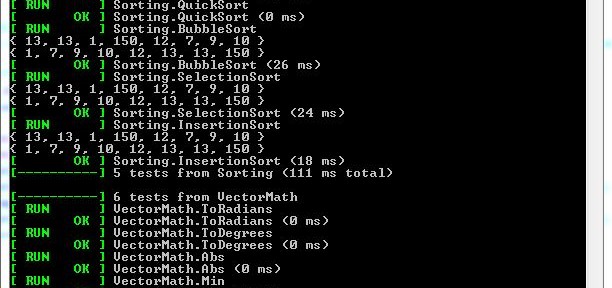A while back I was teaching myself various basic data structures and algorithms,
as well as writing my own allocator classes, when I came to a point where I
needed a simple way to unit test all my workings. I’ve used a couple of unit
tests systems in the past
(boost
for instance) but always found that they didn’t include a nice pretty printer,
nor a simple way to write the tests.
Completely separately I’ve also been working on using
protocol buffers at work for dynamic
messaging between applications (more on this in the future) and noticed they
used a thing called googletest. Long story short, after 30mins (maybe less) I
had created my first unit test and was very happy with just how simple it is! It
also has some really cool floating point test macros, which makes float
comparisons a breeze.
My First Unit Test
It really is very simple to use, here’s a quick test I wrote for my quicksort
function:
TEST( Sorting, QuickSort )
{
static int32_t numbersToSort[] = { 13, 13, 1, 150, 12, 7, 9, 10 };
static size_t sortingLen = sizeof(numbersToSort) / sizeof(int32_t);
Sorting::QuickSort( &numbersToSort, sortingLen );
ASSERT_EQ( 1, numbersToSort[0]);
ASSERT_TRUE( Sorting::Validate( &numbersToSort[0], sortingLen ) );
}
The “TEST” macro has two arguments, the first is the category the test is in (so
for this case, it’s “Sorting”) the second is the name of the test. This will
then basically build a static function which will automatically get added to a
list of functions to test by the compiler using “magic”. The body is whatever I
want to test, so in this case the QuickSort function I’ve written. I then can
test the results by using a nice collection of ASSERT macros, that allow me to
test the output. Really really simple stuff!
Rather than pollute my main applications, I decided to put all my unit tests
into a command line project, so that I can test stuff independently. I’m sure
this would also work in an app as well, if done correctly. Anyway, here’s the
main() function I use:
int32_t
main( int32_t argc, char** argv )
{
::testing::InitGoogleTest(&argc, argv);
int32_t liReturnCode = RUN_ALL_TESTS();
std::cout << "Press ENTER to continue...";
std::cin.ignore( std::numeric_limits::max(), '\n' );
return liReturnCode;
}
You basically just have to call “::testing::InitGoogleTest(&argc, argv)”, then
use the “RUN_ALL_TESTS()” macro to actually execute all the tests! How easy is
that?!
Here’s the output from my test framework (I’ve now written over 300 tests!). I
really like the formatted output, and it also does some basic timings as well
(though not enough for performance testing)

For anyone looking to do some C++ unit testing, I’d highly recommend this as
your solution!